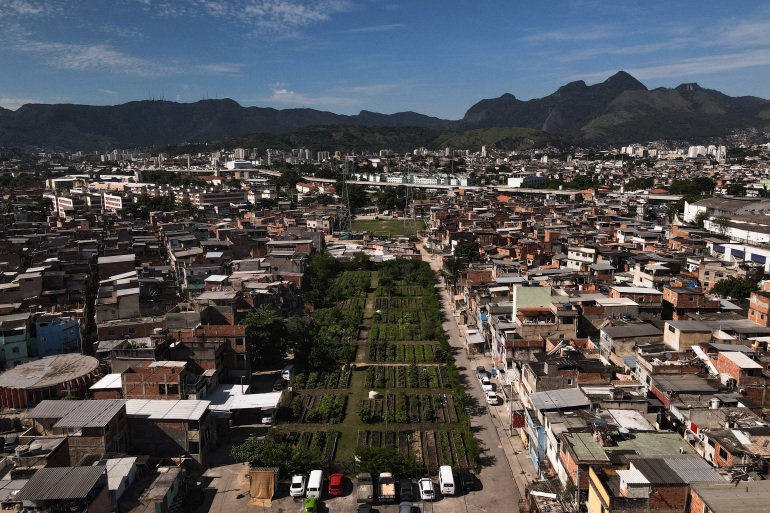
By Charlotte Peet
Rio de Janeiro, Brazil – Every week, Ezequiel Dias, an urban farmer, knocks on the doors of his community’s red-brick, makeshift houses with a delivery of fresh sweet potatoes, pumpkins, onions, cabbage and herbs.
He checks to see if the families require additional help. Some need facemasks, others need soap. But few are hungry. Many of his neighbours – the majority of whom are informal workers, who make up approximately 60 percent of Rio de Janeiro’s labour force, with little-to-no savings – have been unable to work during the COVID-19 pandemic.
The 44-year-old Manguinhos resident knows the grim reality well. Many years ago, he too was at rock bottom. “I was unemployed for five years, helpless, with my family at home to feed,” he told Al Jazeera.
“Then suddenly, the Manguinhos vegetable garden project appeared and turned my life around,” he added.
The Horta de Manguinhos project (Manguinhos vegetable garden), an urban agriculture initiative and Latin America’s largest community farm, is helping at least 800 families survive the coronavirus outbreak, as well as employing more than 20 local workers at a time when Brazil grapples with a pandemic-battered economy.
Dias, who has been employed by the project since it launched in 2013, is now providing seeds of hope to many of the 32,000 residents of Rio’s North Zone Manguinhos complex, one of the city’s poorest clusters of favelas.
According to a 2015 study by Brisbane’s Griffith University, the demographics and standard of poverty in the area are bleak.
More than 15 percent of teenage women have children and in some areas, unemployment is more than 50 percent, making Manguinhos’s Human Development Index as little as 0.65 percent, among the five lowest in Rio de Janeiro, said the report, which was conducted between 2010 and 2015.
‘Our lives are always a fight’
Hortas Cariocas, which founded the Manguinhos vegetable garden project, is one of the few municipal-led social development initiatives that aim to alleviate poverty in communities like Manguinhos. The project was founded to solve food insecurity, boost the local economy and provide fresh, affordable food to residents who would often go weeks without meat or vegetables.
“When we wanted to create the farm 15 years ago, the first thing we thought was that the poor can’t afford to eat organic. The poor need to eat organic, without having to spend a fortune in the supermarket,” explained Julio Cesar Barros, creator of the Hortas Carioca Project.
Learn more: https://www.aljazeera.com/news/2021/3/6/food-security-is-security-brazil-urban-farm-success-story
